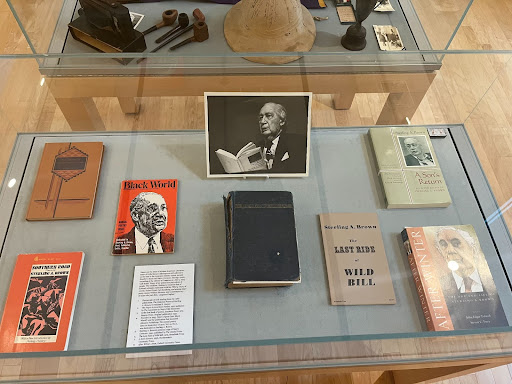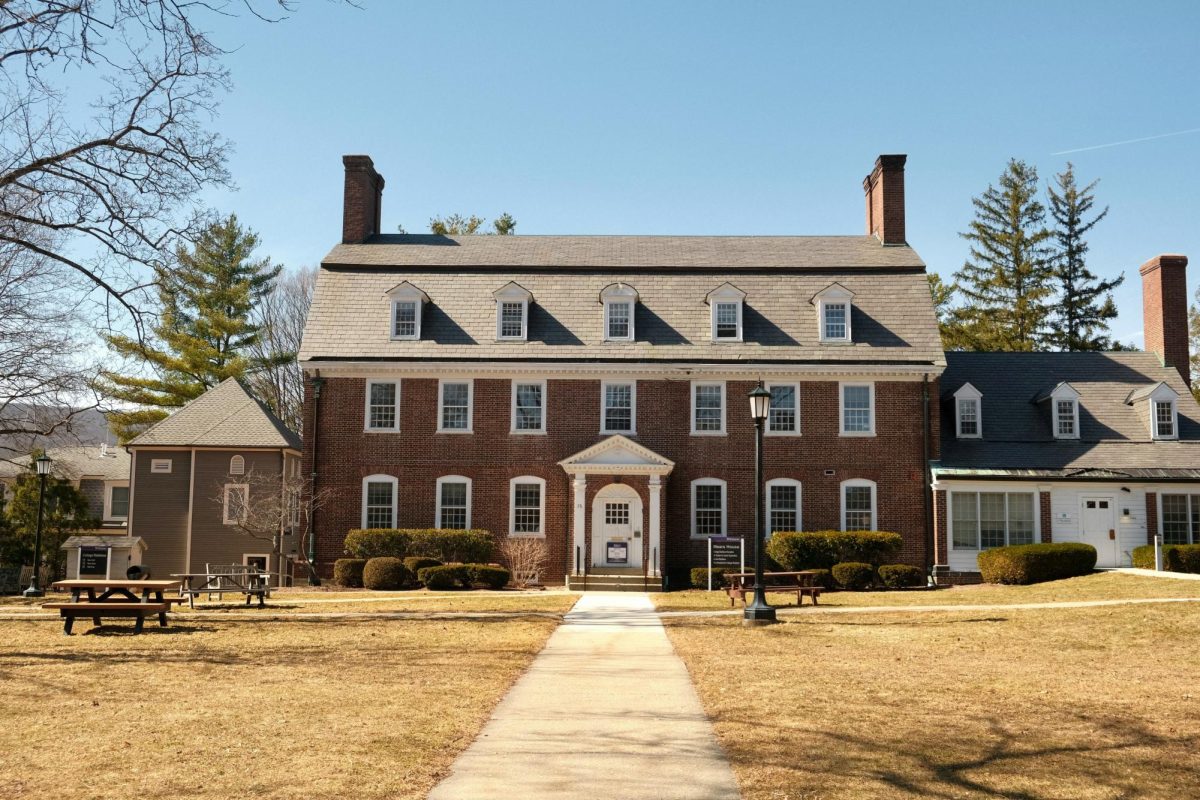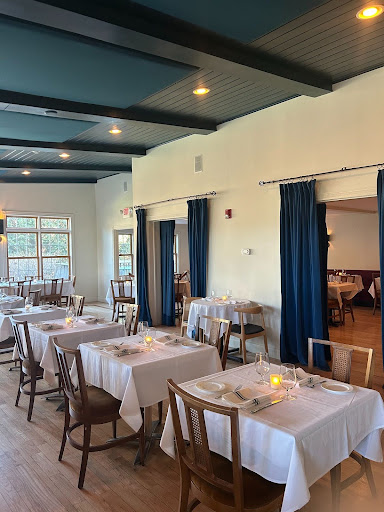College honors life, legacy of alum Sterling A. Brown through archive exhibit and virtual symposium
October 26, 2022

From Oct. 19 to Oct. 21, Williams College Libraries held a virtual symposium entitled “The Life and Lore of Sterling A. Brown: Celebrating Poetry, Prose, and Music,” in celebration of the centennial of Brown’s graduation from the College. The symposium coincided with the opening of a new archival collection in the library archives of Schow and Chapin Art Galleries.
Brown was a poet, professor, critic, and music aficionado who graduated from the College in 1922. His wide body of work explores Blackness in the United States and was foundational to the Black literary tradition.
The collection, named “Revelations” after one of Brown’s poems, contains more than 100 objects, photographs, papers, books, records, and writings that Brown’s family donated to the College in 2019. According to the introductory plaque, “Brown dedicated his time and passions to discovering, uncovering, and recovering what it meant to be Black in America. This act of revealing is evident in his teachings, prose and poetry, and organizational work. These revelations create a safe space for truth-telling through art and also a reimagining of Black lives, Black joy, and the mundanity and freedom in the beingness of Black.”
For the past two years, materials from the collection were available by appointment through Special Collections, and last year, in some courses, such as “Modernisms and the Archive” and “Dislocating the Harlem Renaissance,” students had the opportunity to study the archives and conduct research.
When curating the exhibit, former Sterling A. Brown Archivist Jes Neal, who began processing the materials in 2020 and curated this project, said she wanted to tell Brown’s story linearly. The first four exhibition cases display objects from Brown’s childhood in Washington, D.C., his time attending the College, the family he started with his wife Daisy, and the beginning of his career as a professor at Howard University, where he taught students including Toni Morrison and Kwame Ture.
“Howard was a really big part of who he was as a person,” Neal said in an interview with the Record. “His father taught in the religion department at Howard, and he grew up on the campus. That was a big part of his life that I wanted to be sure that we put some focus on. Him being a Black man working at a Black institution for 40 years, that was essentially his home in many ways, is important.”
The next case displays his publications, beginning with the poem “Southern Road,” which he published in 1932. “This [work] really highlights how he refuted the idea that there was a Harlem Renaissance,” Neal said. “He didn’t think Harlem was the center of Negro creativity and argued that a renaissance lasted for more than a decade.”
The last case departs from the linear story and focuses on Brown’s hobbies and interests, such as tennis and his involvement in Omega Psi Phi at Howard. “I really wanted to highlight his scholarship and him being a professor, but also his humanity,” Neal said. “He was a regular guy who not only believed in the Black community and Black cultural production but [also] believed in having hobbies.”
In preparation for the symposium, Neal served on a planning committee alongside Head of Special Collections Lisa Conathan, Williams College Museum of Art (WCMA) Director of Exhibitions and Collections Management Noah Smalls, Chair and Professor of Africana Studies Rhon S. Manigault-Bryant, and Amalia Culpepper-Wehr ’24. The committee invited session proposals from writers, scholars, and artists for the symposium on any topics celebrating Brown’s life and works.
Neal emphasized the importance of including Black women as presenters at the symposium. “[When planning the symposium keynote], it was important for me to have Black women speaking about Sterling Brown, because in a lot of his works and in a lot of his correspondence, he’s steadily uplifting Black women,” Neal said. “When we think of jazz or blues or poetry, it’s often male-centered.”
The symposium was sponsored by the Williams Black Alumni Network, WCMA, and the Africana Studies Department and included five sessions and three music and poetry performances.
In the sessions’ opening remarks on Oct. 20, Conathan explained how the range of programming reflects the wide range of Brown’s scholarship, personal memorials, and creative expression.
“We’re honored today to serve as stewards of his literary archive,” Conathan said. “The correspondence housed in about 60 manuscript boxes ranges from personal family letters to documentation of Sterling Brown’s work for the Works Progress Administration and reflects the wide influence Brown had on his contemporaries.”
After her introduction, Brown’s granddaughters, Jacqueline Combs and Laura Dennis, and great-granddaughter Gisele Sonnier spoke about their memories with him and the importance of his archives.
“When I was about 10 years old, I remember coming to the front door of my grandparents’ house and seeing my grandfather sitting in his favorite chair,” Combs said. “There were three or four rows of shelves filled with books, and on the floor were more books, creating their own stacks… Now, all these books, records and papers are stored at Williams College for many other generations to enjoy,” she said.
Dennis then reflected on the importance of family to Brown and his writing. “Sterling’s father, Nelson Brown, was born into slavery and wrote a book about his own life history,” she shared. “He became a minister at one of the oldest Black churches in Washington, D.C., and then he retired to devote full time to teaching divinity at Howard University… As a child, Sterling was exposed to the religious using and teachings, genre and rhythms of the early Black church through attending the church that his father ministered at, and you can find that reflected in his poems.”
The introductory session was followed by a poetry reading of “Revelations” by actor LeBaron Thornton, a session on Southern identity, then a keynote by Princeton University Professor of African American Studies and National Book Award Finalist Dr. Imani Perry and Smith College Professor of Africana Studies Paula J. Giddings, moderated by historian Amber Zu-Bolton, who wrote her master’s thesis on Brown’s work.
Programming resumed the next morning with a musical performance by Avery Sharpe, who formerly served as the Sterling Brown Distinguished Visiting Artist in Residence in music at the College as well as a jazz coach and faculty advisor for the College’s Gospel Choir.
Then, several presenters spoke in a session titled “Sterling Brown’s Poetry, Criticism, and Pedagogy.” Associate Professor of Afro-American Studies at the University of Massachusetts-Amherst James Smethurst, for example, discussed the impact of Brown’s work on politics and culture. “One can see in Brown an important influence on the notion of class division and the growth of a complexly divided Black culture,” he said.
Tony Bolden, an associate professor of African and African-American studies at the University of Kansas, highlighted the relevance of Brown’s work to addressing the unique challenges of the 21st century. “Ethno-nationalist white supremacists have virtually monopolized the discourse of emotion, which tends to trump facts and abstract logic,” Bolden said. “But what Brown demonstrated is that the Black vernacular is a reservoir, wherein facts are fused with feelings and creativity with critical thinking.”
Through both the symposium and archives, the organizers said they hope members of the College community can learn more about Brown’s life and work.
“Hopefully it’ll draw more people into the Special Collections and create the interest in wanting to use a collection,” Neal said. “It’s incredibly important to have faculty and staff of color working in archives and libraries at predominately white institutions, [and] Williams should be really proud to have this collection.”







